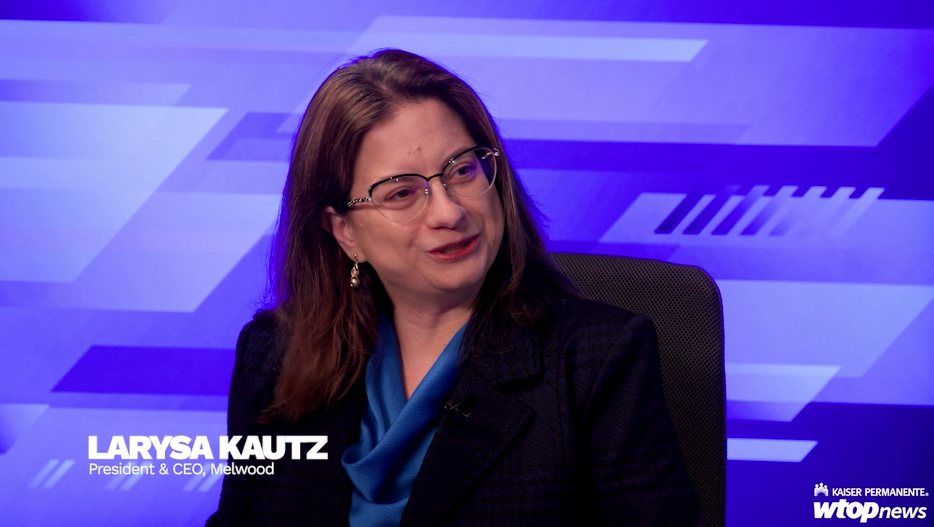Melwood builds inclusive workplaces where mental health, psychological safety and empathy help employees thrive.
This content is sponsored by Kaiser Permanente.
In the high-pressure environment of the D.C. region, workplace stress is nearly unavoidable, but one local nonprofit is proving there’s a better way.
Melwood, a Maryland-based organization that supports and employs people with disabilities, is showing that a strong focus on mental health can make work more effective.
“When you think about health, you do think about physical health, but also mental health and psychological safety,” said Larysa Kautz, president and CEO of Melwood. “Particularly for individuals with disabilities, we want to make sure that we help them thrive in the workforce and be the best employees that they can be.”
For Melwood, the idea of a psychologically safe environment begins the moment a person considers applying for a job, and it continues throughout their time working there.
Job descriptions are written with inclusivity in mind, according to Kautz.
During interviews, candidates may be provided questions in advance and given extra time to prepare, which can help make the whole experience less stressful.
“It’s not supposed to be a ‘gotcha’ moment,” Kautz said. “It’s supposed to be a ‘come and show your best self’ moment, and that continues through orientation, through training and every step of the way.”
Founded more than 60 years ago by a group of parents who believed their adult children with disabilities could work and become economically independent, Melwood has grown into one of the nation’s leading service providers for people with disabilities and their caregivers.
It focuses on a workplace culture that’s centered around employee well-being, where people feel seen as a whole person, not just another worker in the office.
Deeper workplace connections
A culture of well-being isn’t just about making employees feel good.
It gives people the tools and support they need to thrive, and it can make an organization stronger.
“When you can dispel the anxieties, the imposter syndrome and the things so many of us struggle with, you can show up without that weight, take a deep breath and just focus on the job you’re there to do,” said Kautz.
Staff meetings at Melwood include time for employees to share not only their wins, but also what they’re finding challenging, whether that’s related to work or something outside of it.
The value of an open and honest culture has become more obvious in recent years after the COVID-19 pandemic took a toll on mental health and left nearly all workplaces feeling disconnected.
Many employees felt isolated and overwhelmed, leading to a broader conversation about what a healthy work environment should look like.
“Especially during the pandemic, a lot of people realized just how vital those everyday interactions are for mental health,” Kautz said. “Businesses saw that when people feel less alone, they’re not only happier, they’re more productive, more engaged and more likely to stay.”
For Melwood, however, that lesson wasn’t new.
The organization has spent decades building a workplace where psychological safety is prioritized.
“I do think more companies are focusing on it now, and they’re seeing the return on that investment,” Kautz said. “They’re watching their organizations thrive, which is something we’ve known for 60 years, and it’s nice to see others focusing on it too.”
Leading by example
Kautz leads by example, starting with her willingness to speak openly about her own mental health challenges.
She acknowledges the stress she faces and hopes that by doing so, others will feel more comfortable being honest about what they’re going through.
To help send that message, Kautz sometimes carries a subtle but visible reminder in her hand.
It’s a fidget spinner, one of those small devices people spin with their fingers to ease nervous energy.
It helps her feel more grounded.
“I don’t hide the fact that I have anxiety anymore, but I used to hide it because I felt like I’d be looked down on or I wouldn’t be taken as seriously or my work would be questioned,” said Kautz. “I really encourage all leaders to lead with vulnerability and empathy and talk about your struggles.”
That kind of openness is one of the ways Melwood attracts and keeps its employees.
Kautz said she believes more companies should have real conversations with their teams about what challenges they face, and what changes might make a positive difference.
“Sometimes those changes are so small and they’re so inexpensive to keep an employee who might otherwise leave or burn out, or other things like that,” Kautz said. “You’re at work more often than you’re at home, and so hopefully it’s a good place to be.”

